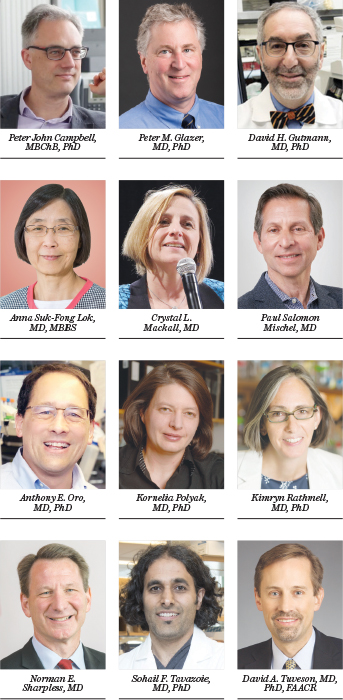The National Academy of Medicine recently announced the election of 90 regular members and 10 international members during its annual meeting. Election to the Academy is considered one of the highest honors in the fields of health and medicine and recognizes individuals who have demonstrated outstanding professional achievement and commitment to service.
The following newly elected members of the National Academy of Medicine are those who serve in the field of oncology. For a complete list of new members, visit https://nam.edu/national-academy-of-medicine-elects-100-new-members-2022/.
Peter John Campbell, MBChB, PhD, Chief, Cancer, Aging, and Somatic Mutation Program, Wellcome Sanger Institute, Cambridgeshire, United Kingdom. For being a pioneer in cancer genomics and tumor evolution.
Peter M. Glazer, MD, PhD, Robert E. Hunter Professor and Chair, Department of Therapeutic Radiology, Yale School of Medicine, New Haven, Connecticut. For discovering that tumor hypoxia causes genetic instability and that IDH1 mutations suppress DNA repair in cancers, conferring vulnerability to radiation and PARP inhibitors.
David H. Gutmann, MD, PhD, Donald O. Schnuck Family Professor of Neurology, Washington University School of Medicine, St. Louis. For seminal contributions to the field of neurofibromatosis and related disorders, establishing novel human and murine preclinical model systems to elucidate the impact of germline genetics, cancer cells of origin, and the tumor microenvironment on pediatric brain tumor biology, patient risk assessment, clinical outcome, and targeted therapeutics.
Anna Suk-Fong Lok, MD, MBBS, Professor of Internal Medicine, University of Michigan, Ann Arbor. For conducting the first systematic study on hepatitis B virus reactivation among patients receiving chemotherapy.
Crystal L. Mackall, MD, Founding Director, Stanford Center for Cancer Cell Therapy, and Ernest and Amelia Gallo Family Professor and Professor of Pediatrics and Medicine, Stanford University, California. For pioneering immune therapies for children’s cancers, and for discovering fundamental principles of human immunology and translating these insights into cutting-edge engineered cell therapies for cancer.
Paul Salomon Mischel, MD, Professor and Vice Chair for Research, Department of Pathology, and Professor, by courtesy, Department of Neurosurgery, Stanford University School of Medicine; Institute Scholar, Sarafan ChEM-H, Stanford University. For his paradigm-shifting research on extrachromosomal DNA, which has opened a new field in cancer biology with profound implications for non-Mendelian disease genetics and the impact of altered genome architecture.
Anthony E. Oro, MD, PhD, Eugene and Gloria Bauer Professor of Dermatology and Co-Director, Stanford Center for Definitive and Curative Medicine and Stanford Maternal and Child Health Research Institute, Stanford University. For solidifying the first link between Hedgehog signaling and human cancer and building chromatin maps identifying how environmental factors drive tumor epigenetic plasticity and drug resistance.
Kornelia Polyak, MD, PhD, Professor of Medicine, Medical Oncology, Dana-Farber Cancer Institute, Boston. For documenting the clinical and functional relevance of intratumoral cellular heterogeneity.
Kimryn Rathmell, MD, PhD, Hugh Jackson Morgan Professor of Medicine and Biochemistry and Chair, Department of Medicine, and Physician-in-Chief, Vanderbilt University Hospital, Vanderbilt University Medical Center, Nashville. For pioneering basic science investigation of kidney cancer and her work revealing the biologic diversity of these tumors, in addition to uncovering novel mechanisms of cancer promotion, paving the way for new therapeutics.
Norman E. Sharpless, MD, Professor of Medicine, Cancer Policy, and Innovation, University of North Carolina School of Medicine, Chapel Hill. For being a highly regarded cancer researcher with significant contributions to advance our understanding of cellular aging, circular RNAs, and the cell cycle.
Sohail F. Tavazoie, MD, PhD, Leon Hess Professor, Rockefeller University, New York City. For seminal studies that have uncovered molecular and cellular processes governing cancer metastasis including the discovery of a hereditary basis for metastasis, and advancing novel antimetastatic therapies into clinical testing.
David A. Tuveson, MD, PhD, FAACR, Roy J. Zuckerberg Professor and Director, Cold Spring Harbor Laboratory Cancer Center, New York. For his transformative leadership in pancreatic cancer biology. His work has led to the development of powerful pancreatic cancer models, which has been fundamental to preclinical studies of understanding targeted therapy and treatment of pancreatic cancer. He most recently has been a leader in organoid-based cancer models.


